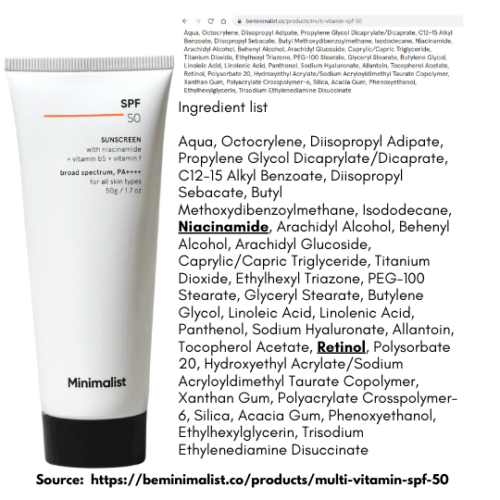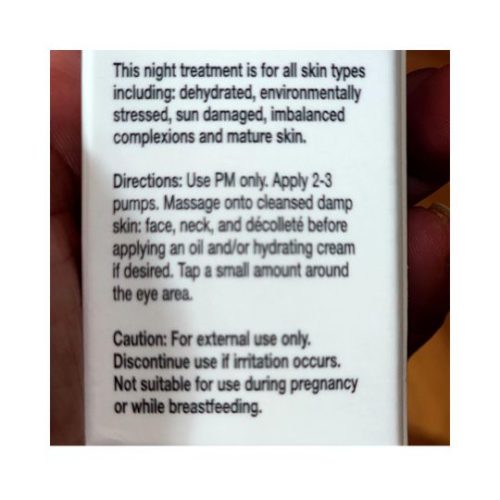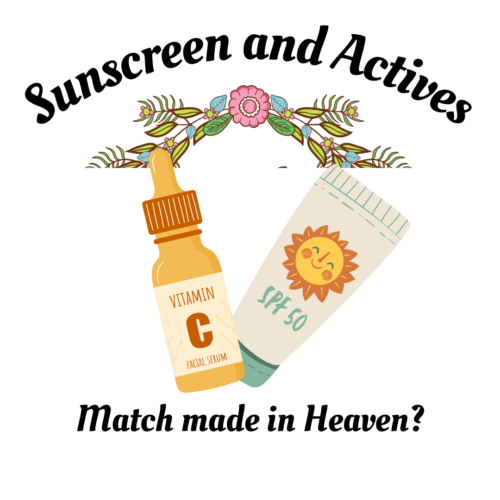Every now and again, I will have a chat with a reader and that gives me food for thought. Thank you for writing in and please keep your questions coming in. (They keep me on my toes).
What was the original Q?
Said reader wanted my view on the sunscreen by an Indian brand, Minimalist, and I’ll review it at a later date. Today, I’m interested in the actives, which the brand takes great pains to emphasize.

Niacinamide and retinol
The packaging emphasizes Niacinamide, panthenol and Vitamin F.
Vitamin F is present in most skincare products and quite frankly is nothing to get excited about (Sorry).
Panthenol is an excellent ingredient to find in your moisturisers and honestly, more products could contain it.
But what I am really excited about is the Niacinamide (on the front of the sunscreen package) and Retinol (hidden in the Ingredients list).
Is Niacinamide a good idea in a sunscreen?
Niacinamide is only active when the pH of the product is between 5.5 to 6.5, which is a small window. The brand advertises the pH of the sunscreen as about 6-7, so there is a likelihood that the Niacinamide in this sunscreen is doing nothing for your skin. As a formulator, I can tell you that its nice to have Niacinamide in a product but its so so tricky to work with: my money is on Niacinamide not being active.
Niacinamide as a skin lightener
Niacinamide at a high percentage (2%) is a skin lightener. It downregulates the transfer of melanosomes from melanocytes to keratinocytes (visible layer of the skin) by 35% – 68%.
The melanosomes contain the skin pigment, Eumelanin which gives us brown skin colour. Eumelanin also has an essential function in our skin by inhibiting UV radiation from penetrating the skin.
In plain English, Eumelanin is our body’s internal, more efficient sunscreen: it’s free, doesn’t require application every 2 hours and is not dose dependent.
By having Niacinamide in the sunscreen you are stripping away the skin’s natural defenses against UV radiation. Is this really your intention?
Retinol
I am reviewing another product, which is essentially an anti-ageing serum and it contains retinol.
These are the Directions:

Notice how the first thing in these instructions is “Use PM only?” The reason for this is because the product contains Retinol.
Retinol encourages collagen synthesis over time, but its immediate impact on the skin is to accelerate epidermal turnover. (Therefore, retinol users constantly complain of dryness).
If you are accelerating epidermal turnover in the skin, you are getting rid of the melanin pigments in the visible layer of the skin (called the Stratum Corneum) at a quicker rate than they are replaced by your body.
In my book this is a recipe for disaster because first, you are going to use this during the day so you are increasing the risk of getting more pigmentation.
But can’t I be fair AND use sunscreen at the same time?
Many of you will write in and say, well isn’t that the point of wearing sunscreen? It provides the extra protection that I need and in the process, if I get fairer what’s the issue?
The fallacy of an invincible sunscreen
I have said this many times: sunscreen is a really terrible solution to tanning and photo-ageing (wrinkles, fine lines, pigmentation) for this reason…
The efficacy of sunscreen has been demonstrated to depend on the QUANTITY YOU APPLY. The designated SPF (e.g. SPF 50 or SPF 30) is measured under strict lab conditions where scientists are measuring out 2mg/cm-2 Secondly, you have to keep reapplying sunscreen every 2 hours to get its full benefit
Are you confident that you are applying 2 mg/cm-2 every two hours?
Statistically, research shows that you are likely to apply LESS than the recommended dosage and by default your sunscreen offers less protection than you think.
Hence my motto: OVERAPPLY sunscreen.
Click here to read a blog on applying less than the recommended amount of sunscreen
Are all actives a bad idea?
I don’t think so.
Many sunscreens as part of their strategy to protect skin against UV radiation, will contain anti-oxidants. For example, stable Vitamin C, Vitamin E.
Its a great idea because anti-oxidants are the first line of defence (if you will) against reactive oxygen species. Reactive Oxygen Species (ROS) generated via UV radiation is responsible for pre-mature ageing (or photo-ageing) because it causes the breakdown of collagen in our skin.
And anti-oxidants offer some level of protection against this….
